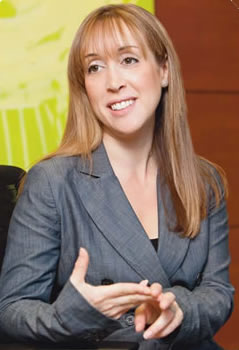When Mom Has Cancer

To learn more about participating in Kaplow's parent-child study, email [email protected] or [email protected].
Helping children cope with a parent's cancer diagnosis
It's natural to want to protect your children from life's scary situations. But figuring out the right way to do that can be difficult -- particularly if the scary situation is a parent's cancer diagnosis.
We talked with Julie Kaplow, Ph.D., a University of Michigan assistant professor of psychiatry who specializes in helping children cope with traumatic events, about how parents with cancer can make the road ahead easier for their children.
Q: Your research focuses on ways to enhance a child's well-being after a parent has been diagnosed with cancer. Can you tell us a little bit about that?
A. It's surprising, but there are actually very few studies that have examined children's mental health when faced with a parent's cancer diagnosis. We know from other studies that adult family members of cancer patients may have high levels of anxiety and post-traumatic stress related to the diagnosis, but this issue hasn't been examined in children. So we're looking at children's coping strategies: How does the child perceive the cancer? Is the child stressed? How frequently is the child communicating with the parents about the cancer? Is the family able to maintain a daily routine? Is the child receiving support? How are the parents coping? Are there certain events -- such as a mother losing her hair -- that might trigger an extreme reaction in a child?
How does your research get at this information?
A. One of our studies is enrolling mothers with breast cancer who have children between the ages of 6 and 12. We interview the mothers and children separately about their thoughts and feelings. We also ask them to complete standardized questionnaires to get a sense of their ability to cope. And then we conduct an interview with the parent and child together where we give mom some questions for the child to answer. The goal is to open up a dialogue around the cancer diagnosis.
What have you learned so far?
A. Our preliminary data shows that open communication between mother and child really seems to be one of the key factors in preventing excessive anxiety or traumatic stress in children. The more moms can talk on an ongoing basis about the cancer and the more she can give her child permission to ask questions, the better that seems to help her child. Sometimes a parent can open the door to conversation, but the child may not know how to respond in that moment. If the child comes back in 10 days with a barrage of questions, it's important that the child feels that they have permission to ask them whenever they arise.
Starting a conversation about cancer can be difficult. Do you have any tips?
A. The bottom line is there's no right or wrong way to talk to a child about cancer. And it's not a one-shot deal: You don't have just one chance to explain it in the most perfect way possible. What you want to do is open up the door of communication. Approach the subject in a simple, more factual way, if possible, so as to not overwhelm your child with details. And then open it up for questions. Make a point of reassuring your child that she will still be cared for and that this is an unfolding process you'll all go through together as a team.
Is it OK to cry if front of your children?
A. Yes, it's OK if you get a little choked up. It helps to normalize the feelings and to let kids know it's OK to be sad and anxious, because you don't know exactly what's going to happen. Tell your children that you want to know what they're feeling and that you want to hear what they have to say if they're feeling scared.
How does the parents' ability to cope affect the child?
A. The parents' psychiatric health -- particularly moms -- is very important. If a child picks up that mom is anxious and depressed, it may have a negative impact on the child. The more momsfeels supported in her own situation -- either from a partner or family and friends -- the more it seems to indirectly buffer the strain on the child's mental health.
Is it ever helpful to hide a cancer diagnosis from a child?
A. Kids know what they're not supposed to know. If parents keep secrets, kids pick up on that immediately, and often their fantasies of what's happening are much, much worse than reality. Being as open as possible -- without overwhelming a child with too much information -- will alleviate a child's fear and anxiety.
What if a child doesn't want to talk about the cancer diagnosis?
A. We believe those children who try to avoid thinking about or talking about a parent's cancer may do poorly over time. So we think it's crucial to help these children find ways of communicate about this. Some ways you might do that is to offer the child a journal that he can use to jot down thoughts, feelings and questions. Or sometimes the child isn't comfortable talking to the parent; help him identify someone else he can confide in.
How do you handle discussions about death and dying?
A. I really encourage parents who are facing late-stage cancers to enlist a partner or a family member in having this conversation. Being honest is important. It's OK to encourage hope, but be realistic and talk through what could happen. The most important message you can convey to the child, though, is: "You will always be cared for, and we will always make sure you are safe and protected."
To learn more about participating in Kaplow's parent-child study, email [email protected] or [email protected].
Read the Winter, 2012 issue of Thrive.
